12 RV Secrets Straight From The Experts
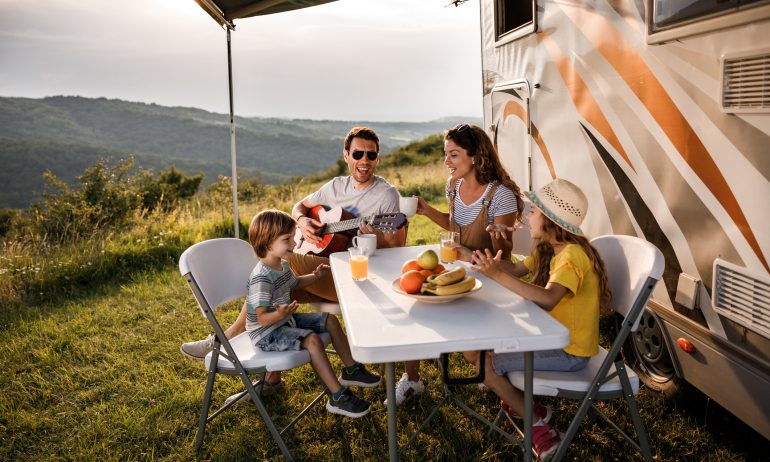
Many or all of the products featured here are from our partners who compensate us. This influences which products we write about and where and how the product appears on a page. However, this does not influence our evaluations. Our opinions are our own. Here is a list of our partners and here's how we make money.
The coronavirus has drastically changed the way Americans travel — for better or for worse. And as pandemic-lockdowns inspire the emergence of new hobbies and interests, travelers itching to get out of the house but who aren’t ready to hop on an airplane are turning to recreational vehicles.
Bookings for fall rose 123% year-over-year between 2019 and 2020 over at peer-to-peer RV rental marketplace RVshare. And Cruise America, an RV rental company, said in an email that it saw a 50% year-over-year increase in first-time RV renters for the summer of 2020 vs 2019.
RVs are certainly popular, but first-time renters shouldn’t automatically assume RVs are an easier, cheaper or more convenient way to travel. Besides taking RV safety into consideration, there’s a lot you need to plan for when it comes to parking, driving and even sketchy Wi-Fi.
We talked to nine RV experts — and embarked on a journey of our own — to find the top tips and secrets when traveling in an RV:
» Learn more: The beginner’s guide to renting an RV
You’ll likely want a second car
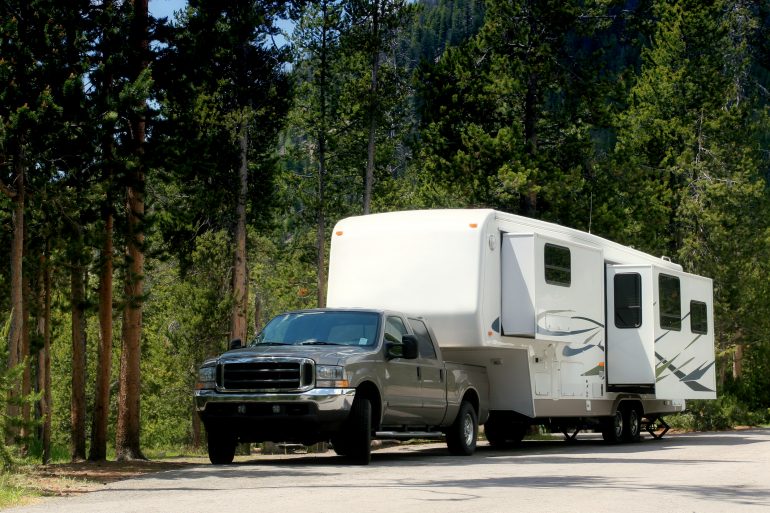
A detachable trailer can make it easier to leave most of your stuff parked at your campsite, while the smaller vehicle allows you to be more agile.
Depending on your travel style, you may find that the RV alone is insufficient. If you like to drive around and explore — whether it’s to a cute downtown area for shopping and dining, to a rugged trailhead for hiking or even to Costco for restocking — you probably don’t want to arrive in a giant motorhome (who knows if there’s even a parking space on a historic Main Street large enough?).
If that’s you, you’ll probably need a car in addition to the RV. But if you go that route, you’ll have to factor in the additional cost plus the feasibility of having a second driver available to actually drive it.
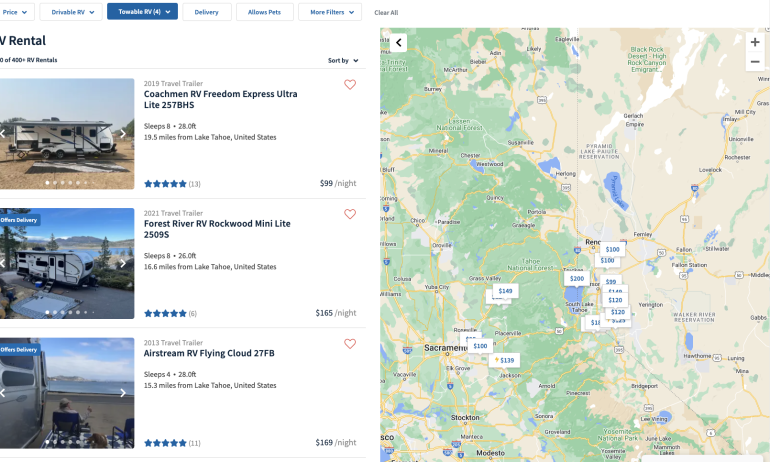
Most major RV rental companies, such as RVshare, allow you to display only towable RVs.
Consider a towable
Given that, you might actually opt for what's called a "towable," which is just a detachable trailer, rather than a full motorhome. That allows you to leave your stuff parked at the campground so you can drive your standard vehicle into town.
The ‘10 Year Rule’ means you could be denied a reservation at a campsite
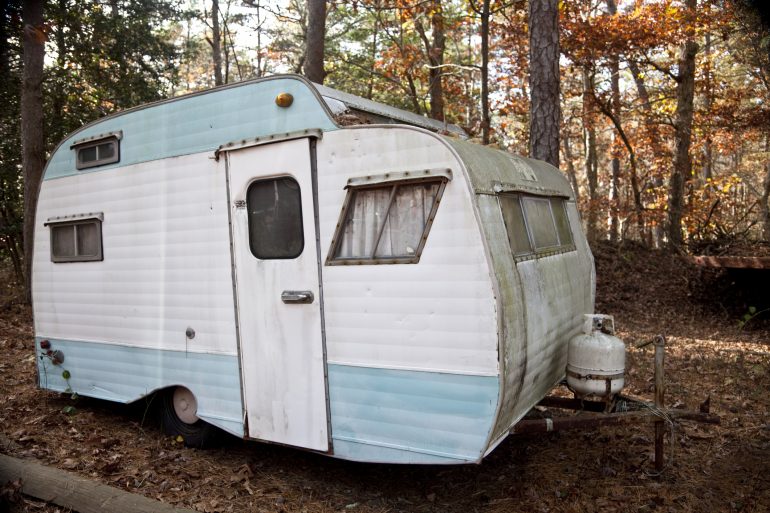
Your retro camper van might look cool on Instagram, but some campgrounds will deny your reservation if your RV is too old.
Sure, older RVs are typically cheaper to rent; for example, a newer Class A RV typically runs between $350-$450 per night on RVshare, but Class A RVs older than 10 years old tend to cost just $150-$250 per night.
But the savings might not be worth it. Some campgrounds enforce a so-called "10 Year Rule," meaning they’ll deny you service if your RV is more than 10 years old.
"The concern stems largely from three things: safety, legality and aesthetics," says Caleb Hartung, CEO of RV marketplace Campspot.
For some campgrounds, the rule is meant to mitigate risk of vehicle breakdowns or electrical issues. At other (typically high-end) RV parks, it’s all about appearances — they don’t want a beat-up RV that’s held together by duct tape messing with the country club vibe.
If you think you can save money by buying an RV that’s previously been used or by renting an older model, keep in mind that you might not actually get to camp in the places you want.
But Hartung also says that most campgrounds are flexible and that sometimes well-maintained RVs may still be admitted — even those older than a decade.
"Certain models, such as Airstreams or refurbished vintage trailers, have a timeless look and often aren't flagged as easily under this restriction," he says. "(For owners), upgrading your hubcaps and paint job, for example, are easy ways to spruce up the appearance of an old RV and bypass the rule."
Your RV should be tall enough for you (but not too tall to drive)

Even the most well-designed van might inevitably be too short for you to stand up in.
If you’re short, then living in an RV is one of the rare aspects of life that’s probably easier for you than anyone else. And if you’re tall, well, prepare to bang your head at least once. Before renting an RV, find out what the interior height is.
"People don't realize how important it is to be able to stand up straight in the van, especially if RV-ing for a while," says Jeltje van den Berg, a travel blogger based in the Netherlands.
Then again, you don’t want a vehicle so tall that you can’t drive on certain roads. Know the height of your RV and ensure it’s not too high to pass under bridges, tunnels and even low hanging branches along your route.
Slide outs seem like a luxury — as long as you can still use the bathroom
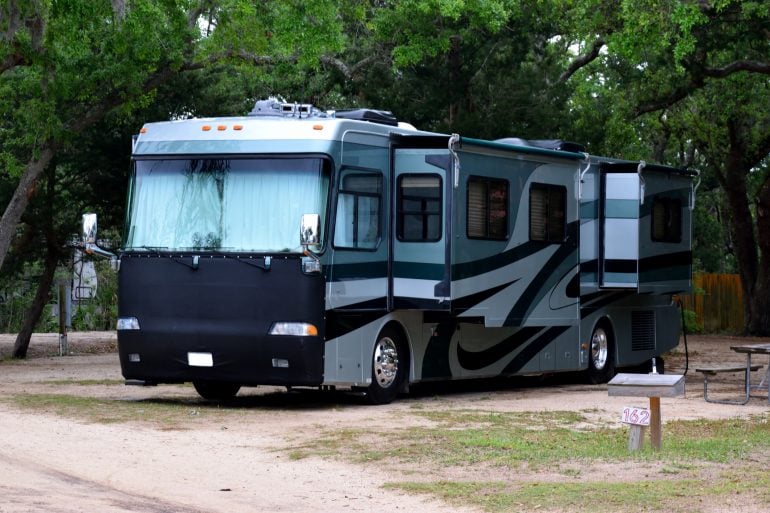
An RV with slides can be a convenient way to add more square footage to your living space — but make sure you can still live without them.
Slide outs are a feature typically found in more luxurious models that extend part of the RV to increase living space. But while slide outs are a convenient way to add more seating or another bed, they become less convenient if they are essential to using parts of your RV.
"Make sure you can access the bathroom and maybe even your bed when the slides are in," says Kelly Beasley, co-founder of RV information site Camp Addict. "Say you want to stop for lunch and eat in the RV or use the bathroom. It’s a real pain if you can’t get to those areas without putting the slides out."
You must ensure your car can actually tow your RV trailer
If you’re towing an RV trailer rather than driving a motorhome, there’s an added layer of complexity: ensuring your vehicle and RV trailer are a fit.
"Sometimes newbies don't take all the steps necessary to ensure their RV trailer and vehicle are a match," says Mike Betts, a test operations supervisor at Nissan’s test center in Arizona.
Dust off the owners manual for both your car and the trailer to find:
Your vehicle's maximum trailer weight.
Your vehicle's maximum tongue load.
Your RV's curb weight (weight of the vehicle without passengers or any cargo).
Your gross vehicle weight (maximum total safe weight of the vehicle, including passengers and cargo).
Knowing those maximum limitations can ensure your vehicle is a match. And once you’ve determined your trailer and vehicle are a fit, make sure they’re connected properly.
"Be sure the safety chains are connected and properly crossed and are not in danger of dragging on the ground," Betts says. "If you have a trailer with brakes, don't forget to connect the cable for the breakaway switch."
Keep in mind that you need to maintain the correct tire pressure on not just the vehicle, but the trailer, too. And don’t forget spare tires — for both the vehicle and trailer.
Overpacking is easy — but it’ll ruin your trip

Space can be limited, though most modern RVs get clever with storage space, such as these over-bed cabinets.
Road trips mean no checked baggage fees, or at least no pressure to fit everything in a small, carry-on to avoid those fees. That’s all good, but it also means it’s easy to overpack.
"Overpacking is a cardinal sin," says Alexander Buteux, a growth lead at VacationRenter who lives in a 72 square-foot camper. "Overpacking in an RV can really change the mood of the trip. Every time you move, you’ll need to move everything you packed."
While it may cost more, Buteux says it’s almost better to rent additional equipment when you’re there, rather than packing it yourself. For example, if you’re going on a three-week road trip and you might golf once, leave your golf bag at home and rent one from the course.
It’s not necessarily cheaper than a hotel
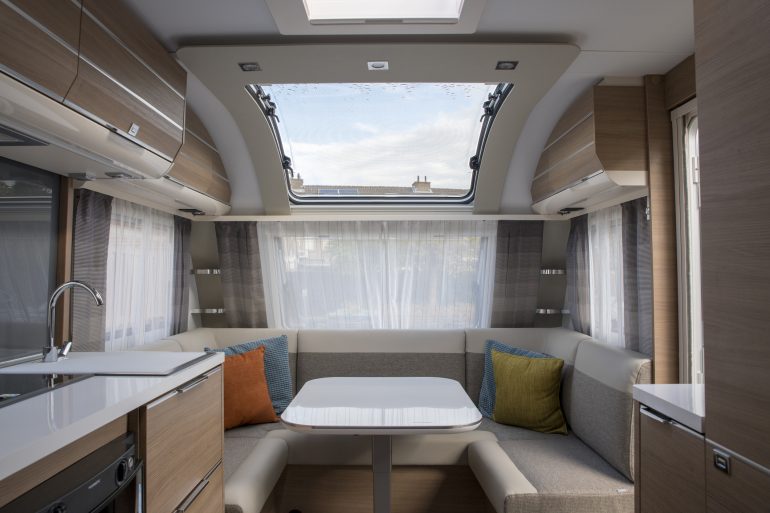
The idea of an RV road trip might mean dreams of a luxury motorhome. But if this kind of RV is what you have in mind, expect to pay more than $1,000 a day in rental costs, in addition to the added fuel costs compared with getting a smaller van.
Depending on how many people travel with you, where you’re headed and how long the trip is, RV life might not be much cheaper than staying in a hotel.
"Many people who are not familiar with RVing tend to think that it is always cheap, but that’s far from the truth," says Michelle Schroeder, a full-time traveler who recently traded living in an RV in favor of living on a sailboat.
If you're seeking to own RVs prices typically range from $6,000 to $22,000 for folding camping trailers to $60,000-$500,000 for Type A motorhomes, according to data from the RV Industry Association.
The cost to rent an RV typically runs between $50 to $450 a night, depending on whether you're going for a small travel trailer or a bus-sized RV that resembles a small house. but those aren't the only costs to factor in:
Camping fees: If you're seeking to spend the night in a national park, fees range from $25 to $60 a night, according to Cruise America, while luxury RV parks can cost over $100 a night.
And understand the true cost there, too. Some advertised rates are simply the cost to park, but there might be an additional charge per person in the vehicle. Campgrounds might also charge extra for amenities like Wi-Fi.
Other rental fees: If you're renting, you'll probably owe a few other fees, which can include:
Fees for excess mileage or refueling fees if you don't return it with a full tank of gas or propane.
Cleaning, pet and smoking fees.
Service fees, no-show fees and delivery fees.
Others tack on extra costs to use things you might assume are included like cooking supplies, towels or the generator.
Summer has its pros and cons
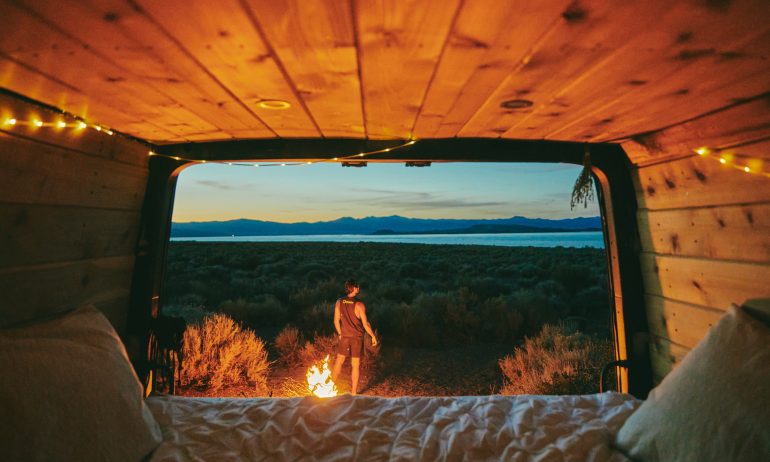
Summer is naturally one of the best times to vacation, but it makes even more sense for RV vacations. Warmer weather means fewer jackets you need to pack in already-tight spaces, and more time you can spend outdoors rather than inside what's ultimately still close quarters — even in the biggest RVs. And a cold shower is less painful when it's warm outside anyway.
But summer also brings challenges, including higher costs and bigger crowds. It also means your RV will likely be scorching hot when you head inside — unless you have air conditioning. Rental sites like RVshare make it easy to filter by rentals with air conditioning — which you'll likely want — but understand that you'll either need a hookup or generator to power it, which comes with its own costs.
Boondocking can save you money, but it requires more work
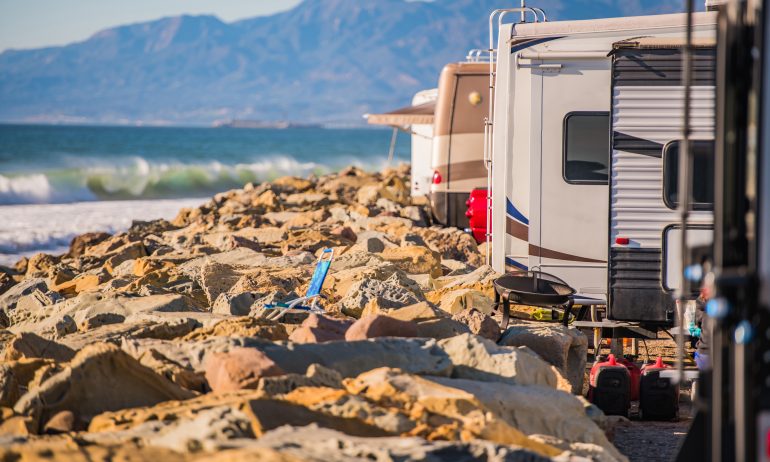
Camping overnight on the side of the road is what's referred to as boondoocking.
To save money on campsites, Schroeder recommends "boondocking" — or camping outside of an official campground (so no sewer, water or electric hookups). You could find yourself boondocking anywhere from free public land to most Walmart parking lots. Just know that it's not always legal to park overnight, so understand the rules where you intend to camp.
If you go that route, Young recommends renting a vehicle designed specifically for boondocking.
"Boondocking rigs have features like solar power and water pumps so they can function without electricity," Young said. "They also have composting toilets instead of black tanks so that you don’t have to search for a dump site every few days."
Prepare the right kinds of food

Fruit can work great on a grill.
RVs are an easy way to save money on expensive restaurant bills, either by cooking in the RV's own kitchen or grilling hotdogs on the barbecue each night.
But understand what you're packing and how you're storing it. You don't want to attract bears and, what's probably more likely, ants. For snacks like chips and cookies, individually-packed snacks are often better than the Costco-size pack. If ants get into it, you won't have wasted what was leftover. If anything, invest in good, sealed containers.
To cut down on kitchen equipment, stick to items that can be prepared in one container — soups and stir fry dishes usually fit the bill. As far as grilling, pretty much anything goes — and the best grilling dishes go beyond just meats. Veggies work great, and fruits like pineapple, pears and apples grill surprisingly well too. Even pizzas and pies star on the grill.
Pack an extension cord
If you opt to camp at a campground where you intend to use the hookups, bring your own extension cord.
"Sometimes the plug-in box is shared between a few sites and might be 20-30 feet away from your spot," says RV enthusiast David Boehl.
Be aware of the Wi-Fi situation

If your job suddenly allows you to work from anywhere and you’re thinking about the possibility of remote work as an RV nomad, understand what the Wi-Fi is like (and whether there's an additional fee) before heading out on the go.
If you're banking on campground Wi-Fi, read the reviews online first to ensure it's up to your standards.
"Just because a campground says it has Wi-Fi doesn't mean it's going to work," says Michelle Fishburne, a writer who travels in an RV as part of a project profiling ordinary Americans. "Often the source of the signal is too far away, or the campground's bandwidth service is not enough to handle the usage."
Fishburne estimates that about 40% of the time at campgrounds promising Wi-Fi, she struggles to reliably send emails.
Luckily, many campgrounds have dramatically improved their Wi-Fi offerings in recent years, largely in light of work-from-home culture. Wi-Fi is free at most Sun RV resorts, which is among the largest campground providers in the U.S.
If you own your RV, you can install Wi-Fi in your RV, such as through satellite setups or by using mobile internet routers.
As a backup plan, invest in an unlimited data plan that allows you to use your smartphone as a hotspot. Or, research free Wi-Fi locations to find a coffee shop or library nearby.
The bottom line
Road tripping in an RV is a delightful way to see the country — especially if coronavirus has you avoiding airplanes and hotels, or if you’re in a newfound remote job that allows you to travel.
Before committing to an RV vacation, understand that there will be challenges you perhaps didn’t anticipate. Prepare yourself for the possibility that — in many ways — you’ll be unprepared. The #vanlife social media influencers probably won’t show you what it’s like emptying the bathroom and they won’t share every time they accidentally bump their head on the doorway.
How to maximize your rewards
You want a travel credit card that prioritizes what’s important to you. Here are our picks for the best travel credit cards of 2024, including those best for:
Flexibility, point transfers and a large bonus: Chase Sapphire Preferred® Card
No annual fee: Bank of America® Travel Rewards credit card
Flat-rate travel rewards: Capital One Venture Rewards Credit Card
Bonus travel rewards and high-end perks: Chase Sapphire Reserve®
Luxury perks: The Platinum Card® from American Express
Business travelers: Ink Business Preferred® Credit Card
on Chase's website
1x-5x
Points60,000
Pointson Chase's website
1.5%-6.5%
Cashback$300
2x-5x
Miles75,000
Miles




